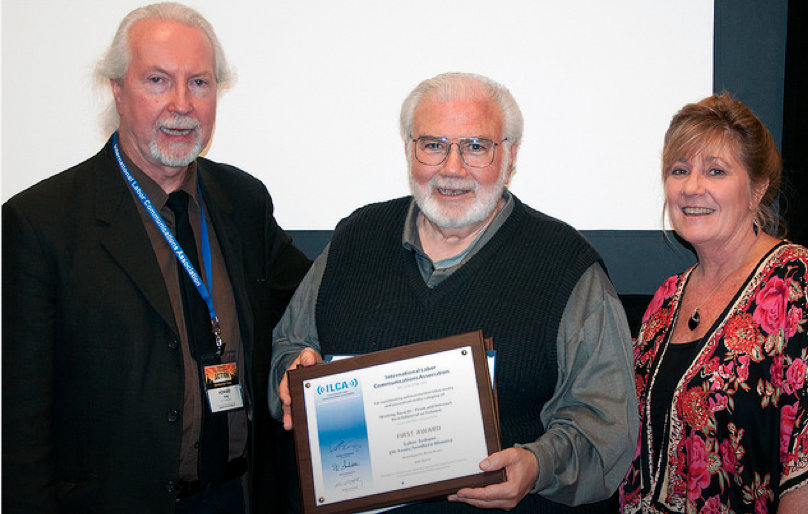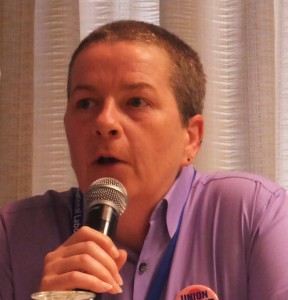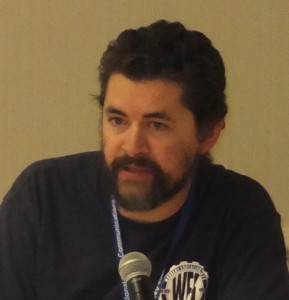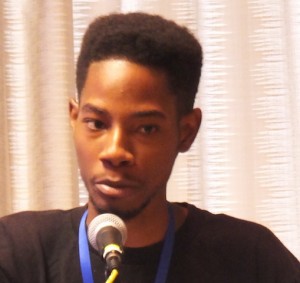
Raleigh, N.C. – Three St. Louis activists were prominently featured in the 60th Anniversary convention of the International Labor Communications Association (ILCA) meeting here recently.
“Communicating for ACTION, Coordinating for Change” brought more than 100 labor communicators from across America into the heart of right-to-work country to demonstrate that unions are alive and kicking in the right-to-work South despite the best efforts of corporate America to quash them.
With a program that featured speakers and discussions on a wide range of today’s critical issues, a major focus was on building worker power everywhere while fighting to survive in a growing right-to-work environment.
Three St. Louisans had direct input on that issue:
• Laura Kelley, co-chair of the United Food & Commercial Workers national OutReach program and a union representative with St. Louis UFCW Local 655;
• Tony Pecinovsky, president of the St. Louis Workers Education Society; and
• Rasheen Aldridge, director of Young Activists United in St. Louis and the youngest member appointed by Gov. Jay Nixon to the Ferguson Commission.
Gay community needs to be understood, not ignored

“A major problem facing so many unions is how to communicate with their LGBTQ members, an important segment of the labor movement that we simply cannot ignore or walk away from,” said Kelley, discussing lesbian, bisexual, gay, transgender and queer issues. She is a lesbian and makes no bones, or apologies, about it.
She was part of a breakout session, Building Membership in a Right-to-Work Environment, with four others.
“As leadership, as members, we all have to have the conversation about LGBTQ issues so we can bring about understanding and acceptance that they are our union brothers and sisters, “she stressed, noting that the purpose of the UFCW’s OUTReach program is to give everyone the tools to have that conversation.
Unions are about equality, and it needs to be all across the board, she stressed, noting that 35 states have negative laws impacting LGBTQ individuals.
UNION CONTRACT IS PROTECTION
“The union contract is protection for everyone, even in those states that don’t have legal protections on their books,” Kelley pointed out proudly.
In discussing the need to educate our union members about LGBTQ issues, she added, “knowledge is a healing power. We need to be comfortable with one another, and learning to talk about the issues with one another is the key to that healing.”
That education is a step-by-step process, Kelley pointed out. And it works, she added, noting that across the nation, more LGBTQ members are responding to the unions who understand, and accept, their issues as they accept the issues of straight members.
“If you’re not educated about these issues, you are certainly not ignorant. But if you refused to get educated, refuse to understand what the LGBTQ members are all about, that’s ignorant.
“I bleed just like you. My wife and I love my child just like you love yours. Equality for all is what the union is all about. Please take that message back to your members,” she implored the delegates.
Worker power requires independence to be effective

As part of a panel discussion of Campaigns and Alliances that Build Worker Power, St. Louisan Tony Pecinovsky outlined the targeted efforts of the St. Louis Workers Education Society (WES), of which he is president, to impact issues within a targeted geographical area that encompasses only three of the city’s 28 wards.
Launched two years ago, WES’s goal is to amplify the voices of women, people of color, immigrants, youth, students, and the LGBTQ and disability communities and blend them with unions, churches, schools, community and political leaders so that they these groups have a voice in the discussions of things that happen in the three wards.
The group’s membership is intentionally varied, Pecinovsky proudly pointed out: Coalition of Black Trade Unionists, CWA, ‘Show Me $15’, SEIU, the Operating Engineers,’ the Painters’, Jobs with Justice, Latinos’ En Exion-STL (an immigrant rights organization), the Coalition for Truth In Independence (a disability rights organization), SHERA (a African American women’s rights group), and Young Activists United-StL (a city-wide youth and student organization).
“It’s important to build worker power from a place of independence,” he stressed, noting that WES funding is basically voluntary so that “we are not beholden to any outside sources of revenue,” adding that it’s having an independent financial structure “that makes worker power so dangerous to big business.”
By being able to influence people and issues in three wards, WES will be able, hopefully, to influence citywide issues that affect workers. And it’s working, he stressed.
“Through “civic engagement, issue based voter education, door knocking, one-on-one conversations and phone-banking we were instrumental in educating and mobilizing voters who ousted a 20-year incumbent and installed a progressive, pro-union single mom as the ward’s new Alderperson.
“This victory exemplifies how campaigns and alliances can help build worker power,” Pecinovsky stressed, noting that an expanded coalition also helped raise the minimum wage in St. Louis to $11 an hour by 2018.
These victories, he concluded, are “A real demonstration of Campaigns and Alliances that Build Worker Power and thereby change peoples’ lives for the better.”
Fighting for justice means improving economics as well as civil rights

Talking to the racial disparity issues on the Black Lives Matters breakout session, St. Louis African-American Rasheen Aldridge told the dramatic story of the differences he experienced living as a youngster in North St. Louis and being bussed to school in an upscale St. Louis County community as part of the desegregation transportation program.
“It was like living two lives. In my community, you felt like you were living in a cage. In the country, you were free, you didn’t have to worry that you would be hurt.”
He shocked the audience by noting that in the St. Louis County more affluent ZIP code of 63105, the odds of a young African-American male dying prematurely was 90 percent; in the city’s lower income ZIP code 63106, it was 62 percent. Median income in the former was $90,000 but only $15,000 in the latter.
“Certainly all lives matter, but we’ve focused on black lives matter because people of color are tired of being treated differently than any other race,” he stressed.
‘PEOPLE WERE PISSED’
In discussing the Ferguson issue, he said candidly that the time for rational reason had passed. “People were pissed. It was chaos. The organizing skills we had learned in Show Me $15 campaign just couldn’t work. Unfortunately, it took for Quick Trip to burn to get the attention of people, to get them to listen.
“You can’t talk about justice without looking at economic justice issues, incarnation rates of blacks vs whites, etc. It is a race issue that has to be confronted. We have to look at all the injustices, not just the racial injustice.”
The simply truth is, he added, African-Americans are tired of not having opportunities.
Aldridge was introduced to the labor movement and organizing through the Show Me $15 campaign. He quickly became a prominent spokesman and after the Ferguson crisis in which he was also involved, Gov. Jay Nixon appointed him to the Ferguson Commission to create policies to impact changes in the aftermath of that community’s tragedy. Today he is director of Young Activists United in St. Louis.
[box style=”4″]
Unions can thrive if we organize, Tefere tells union communicators
We need to change voters, not politicians
By LARRY RUBIN
Raleigh, N.C. – “Organize, organize, organize – that’s how we can overcome income inequality,” AFL-CIO Executive Vice President Tefere Gebre told union communicators meeting here.
“We can make government more pro-labor,” he said, “but it doesn’t work to try to change politicians. We must work to change voters,” the union leader told attendees at the recent 2015 convention of the International Labor Communications Association (ILCA). Its members work for unions as journalists, social media experts and spokespersons.
Gebre emigrated to the U.S. from war-torn Ethiopia as a teen and began his union career as a night shift loader at UPS and a member of Teamsters Local 396.
PARTNERS ARE CRITICAL
“The issues that are facing working families today are big, and the only answer is to be big in return,” Gebre said. “We are too small to do the job by ourselves. We must join with civil rights groups, church members, parents, immigrants, labor councils and foundations.”
For example, he said, “We should join the movement against mass incarcerations. The U.S. has more prisoners than China or Russia. Prisons are being privatized. The union movement should join with others who are saying ‘instead of building more prisons, we should be creating more jobs and offering more job training.'”
“Union halls,” he said, “used to be more than just places where you talk about work. They used to be part of the community, where all people could come and be together. We have to get back to that.”
IT’S NOT WORKING
Gebre criticized the way many progressive organizations conduct election campaigns. “What we are doing is not working,” he said.
“If we have somebody to run, the first thing we do is hire a pollster. The pollster advises us that ‘if the candidate talks about the things that really concern you, she’ll lose.’ So the candidate says the things she needs to say to get elected.
“But once elected, the candidate sticks to the agenda that got her elected. She’s useless to us.
“We have to engage in year-around politics, not just politics around elections,” Gebre said. “We can’t depend on a hero on a white horse to come and fix things.
“We shouldn’t follow the poll results. We should work to create new poll results.”
For example, he said, union leaders shouldn’t shy away from talking about tax policies. They should try to convince people that better schools are needed, and that costs money.
OPTIMISTIC IF….
Gebre was optimistic about what workers can accomplish if they organize.
He described his own experience as an organizer in Orange County, Calif. “It used to be solid Republican,” he said. “But unions joined with many other organizations and community groups in a campaign for a ballot initiative to increase taxes for schools and services.
“Companies threatened to leave Orange County. All the experts said we would never win. But we did.”
Gebre said, “If we can win in Orange County by working with others, we can win anywhere the same way, even here in the South.
He concluded: “Don’t ever listen to those who say that the workers’ movement is dead. Workers will always find a way to organize and fight back. There is no lack of spirit.”
(Reprint, People’s World)

